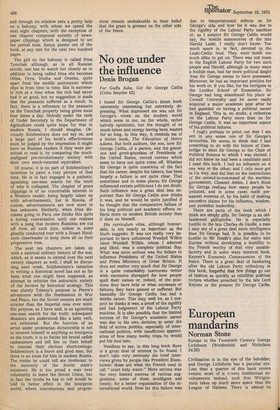No one under the influence
Denis Brogan
For Goft Sake, Go! Sir George Catlin (Colin Smythe £5) I found Sir George Catlin's latest book extremely interesting but extremely depressing. What depressed me was not Sir George's views on the modern World which seem to me, on the whole, rather naively optimistic, but the thought of .so much talent and energy having been wasted for so long. In this way, it reminds me of a better book, The Education of Henry Adams. But both authors, the son, now Sir George Catlin, of a parson, and the grand son and great-grandson of Presidents of the United States, record careers which seem to have not quite come off. Whether Sir George is quite conscious of the fact that his career, despite his talents, has been largely a failure is not quite clear. That sometimes and in some places Sir George influenced certain politicians I do not doubt.
Such influence was a great deal less im portant than Sir George Catlin now thinks it was, and he would be quite justified if he thought that the comparative failure of his long political and academic efforts reflects more on modern British society than it does on himself.
His curriculum vitae, although honourable, is not nearly as important as the blurb suggests. It was not really very im portant to have influenced Wendell Wilkie since Wendell Wilkie, whom I admired and liked, was a complete political flop.
What was more serious was the failure to influence Presidents of the United States and Prime Ministers of Great Britain. It does not matter very much that Sir George is a quite remarkably inaccurate writer with excessive disregard for how people spell their narnes or, indeed, of the positions they have held or what successes or failures they have gained or suffered. But basically Sir George Catlin has had a sterile career. This may well be, as I sus pect he thinks it was, a proof of the rigidity and bad judgement of the Labour Party machine. It is also possible that the limited success of Sir George's academic career was due to his own decision to enter the field of active politics, especially of inter national politics, with insufficient appreciation of how many booby traps he would put his foot into.
Needless to say, in this long book there is a great deal of interest to be found. I don't take very seriously the brief interviews given by people like President Eisenhower: these are what the French used to call "court holy water." More serious was the very limited success of various suggestions, some of them intelligent and timely, for a better organisation of the international world. How far this failure was due to temperamental defects on Sir George's side and how far it was due to the rigidity of the Labour Party machine or, as I suspect Sir George Catlin would say, the hostile manoeuvres of the late Harold Laski, I really don't know. Too much space is, in fact, devoted to the Laski-Catlin feud. They were much too much alike to get on. There was not room in the English Labour Party for two such people and Harold, although in many ways a foolish man, had far more political doigte than Sir George seems to have possessed. Moreover, he had an important position for his work or, if you like, for his intrigues in the London School of Economics. Sir George had long abandoned his place at Cornell University and he never really acquired a major academic post after he had gambled on having a political career in England. This is, no doubt, a reflection on the Labour Party more than on Sir George Catlin, It was an important aspect of his political failures.
I ought perhaps to point out that I am not in any sense one of Sir George's favourites. He seems to think that I had something to do with the failure of Cambridge to elect Sir George to the Chair of Political Science to which I was elected: I did not know he had been a candidate until I read this book. I had no influence on it one way or the other; and I only once got in his way, and did that on the instructions of the second-in-dcornmand of the wartime government, Clement Attlee. I don't think Sir George realises how many people he irritated, and in some cases made permanent enemies of, by his habit of making excessive claims for his influence, wisdom, and potential leadership.
There are parts of the book which I think are simply silly. Sir George is an old fashioned gallophobe. He is especially hostile to the late Charles de Gaulle, a man I may say of a great deal more intelligence than Sir George had. It is possible to be hostile to Mr Heath's plan for entry into Europe without developing a hostility to the French worthy of that very unsatisfactory and in some ways immoral book, Keynes's Economic Consequences of the Peace. There is a great deal of hankering after the old Labour Party orthodoxy in this book, forgetful that few things go out of fashion as quickly as infallible political recipes whether preached by the late Lord Keynes or the present Sir George Catlin.


































 Previous page
Previous page